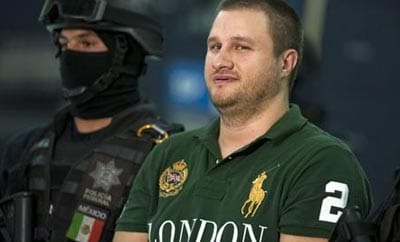Imprisoned cartel leader Edgar Valdez Villareal, alias “La Barbie,” has accused Mexico‘s former president and public security secretary of corruption, though the capo’s claims are undermined by the fact that he is about to be extradited to the United States.
In a letter which La Barbie’s lawyer made available to Reforma, the drug trafficker states that he was arrested in August 2010 because he refused to participate in a pact that President Felipe Calderon was attempting to organize between Mexico’s warring cartels. The arrest was “political persecution,” La Barbie adds.
The letter then states that retired Mexican General Mario Acosta Chaparro, who was murdered in Mexico City in April, was Calderon’s envoy between the criminal organizations.
The letter goes on to accuse Public Security Secretary Genaro Garcia Luna of having received money from La Barbie since 2002, along with other officials from the Secretariat of Public Security (SSP) and the federal police.
La Barbie, a US citizen and a former leader of the Beltran Leyva Organization (BLO), is awaiting extradition to the United States on drug trafficking charges. Investigative magazine Proceso had reported that he might even be extradited before Calderon left office on December 1. La Barbie is also charged with various crimes in Mexico, including drug trafficking, kidnapping, and homicide. He is currently being held in a maximum security prison in Mexico State.
InSight Crime Analysis
The statements by La Barbie follow accusations he made the previous week, asserting that officials from the attorney general’s organized crime unit (SEIDO) asked him to lie on their behalf. According to La Barbie’s account, the officials wanted him to lie and say that he knew of links between retired General Tomas Angeles Dauahare and organized criminal groups. The general was arrested in May along with five other officers, accused of collaborating with the BLO. La Barbie has claimed he knows nothing about their case.
This string of accusations raises the question of why La Barbie is suddenly so eager to issue public statements, after nearly two years of relative silence from his jail cell. The thrust of his more recent allegations — that officials in both the SSP and the SEIDO have received payments from organized criminal groups — could certainly be accurate. Additionally, his assertion that the government was in the process of negotiating a “narco-pact” plays to fears that the Calderon administration had some kind of agreement with the Sinaloa Cartel.
However, there is reason to question La Barbie’s motives. Given that the trafficker will probably soon be extradited to the United States, it seems likely that his statements are intended to remind the government that he willing to sling mud. It is possible that he intends such statements to discourage the government from extraditing him. Unsurprisingly, the SSP quickly already issued a statement dismissing La Barbie’s claims, asserting that he was trying to “discredit” the government.
La Barbie’s assertion that he is a victim of “political persecution” also detracts from his credibility. Such a claim has often been invoked by drug traffickers, most famously by Pablo Escobar, in order to depict themselves as victims who merely want to tell the truth about a corrupt government. Colombian drug trafficker Henry de Jesus Lopez Londoño, alias “Mi Sangre,” of the Urabeños, recently made the same claim from Argentina, where he is fighting extradition to Colombia and the United States.
Government agencies under Calderon had to fight off various accusations of ties to organized crime. Recently, a group of federal police officers were arrested and charged with deliberately trying to assassinate two US Central Intelligence Agency (CIA) agents in an attack last August. Such incidents raise real and pressing concerns about government corruption, but the allegations from La Barbie seem more ridiculous than convincing.

